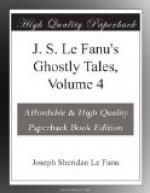Like everything else in the town, it had suffered a metamorphosis. The stained and ragged walls were now erect, perfect, and covered with pebble-dash; window-panes glittered coldly in every window; the green hall-door had a bright brass knocker on it. Peter did not know whether to believe his previous or his present impressions; seeing is believing, and Peter could not dispute the reality of the scene. All the records of his memory seemed but the images of a tipsy dream. In a trance of astonishment and perplexity, therefore, he submitted himself to the chances of his adventure.
The door opened, the officer beckoned with a melancholy air of authority to Peter, and entered. Our hero followed him into a sort of hall, which was very dark, but he was guided by the steps of the soldier, and, in silence, they ascended the stairs. The moonlight, which shone in at the lobbies, showed an old, dark wainscoting, and a heavy, oak banister. They passed by closed doors at different landing-places, but all was dark and silent as, indeed, became that late hour of the night.
Now they ascended to the topmost floor. The captain paused for a minute at the nearest door, and, with a heavy groan, pushing it open, entered the room. Peter remained at the threshold. A slight female form in a sort of loose, white robe, and with a great deal of dark hair hanging loosely about her, was standing in the middle of the floor, with her back towards them.
The soldier stopped short before he reached her, and said, in a voice of great anguish, “Still the same, sweet bird—sweet bird! still the same.” Whereupon, she turned suddenly, and threw her arms about the neck of the officer, with a gesture of fondness and despair, and her frame was agitated as if by a burst of sobs. He held her close to his breast in silence; and honest Peter felt a strange terror creep over him, as he witnessed these mysterious sorrows and endearments.
“To-night, to-night—and then ten years more—ten long years—another ten years.”
The officer and the lady seemed to speak these words together; her voice mingled with his in a musical and fearful wail, like a distant summer wind, in the dead hour of night, wandering through ruins. Then he heard the officer say, alone, in a voice of anguish—
“Upon me be it all, for ever, sweet birdie, upon me.”
And again they seemed to mourn together in the same soft and desolate wail, like sounds of grief heard from a great distance.
Peter was thrilled with horror, but he was also under a strange fascination; and an intense and dreadful curiosity held him fast.
The moon was shining obliquely into the room, and through the window Peter saw the familiar slopes of the Park, sleeping mistily under its shimmer. He could also see the furniture of the room with tolerable distinctness—the old balloon-backed chairs, a four-post bed in a sort of recess, and a rack against the wall, from which hung some military clothes and accoutrements; and the sight of all these homely objects reassured him somewhat, and he could not help feeling unspeakably curious to see the face of the girl whose long hair was streaming over the officer’s epaulet.




